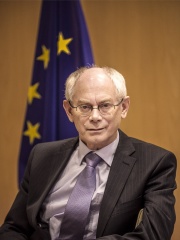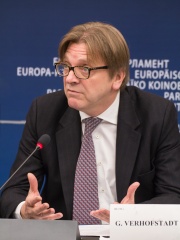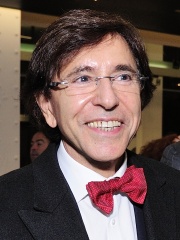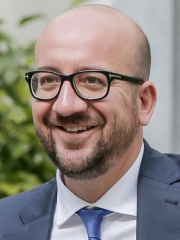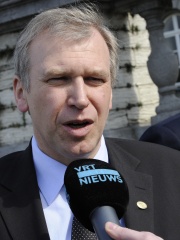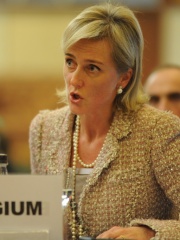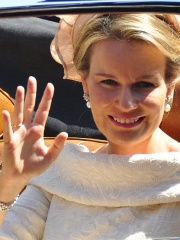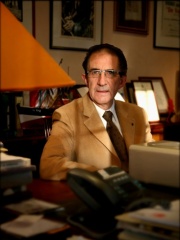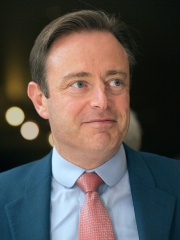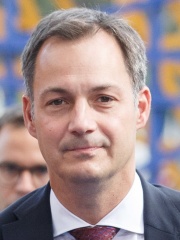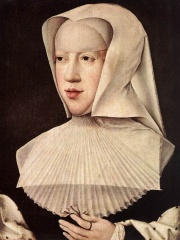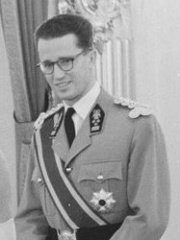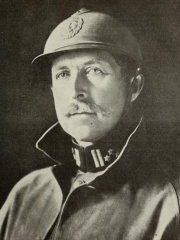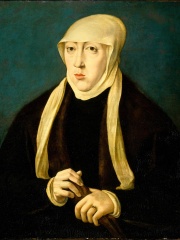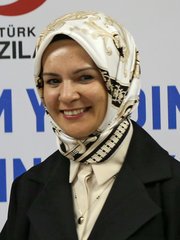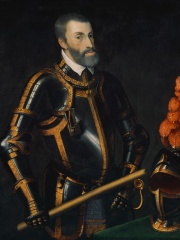
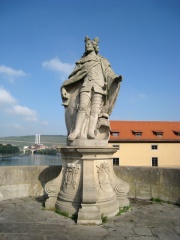

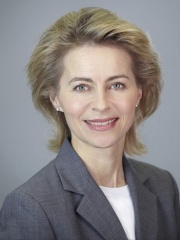
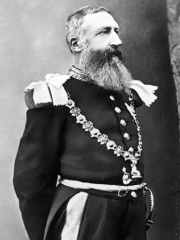
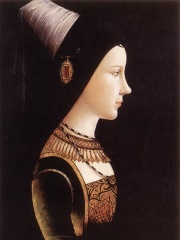
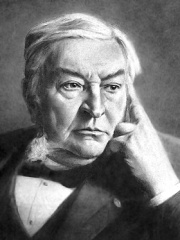
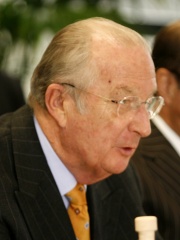
The Most Famous
POLITICIANS from Belgium
This page contains a list of the greatest Belgian Politicians. The pantheon dataset contains 19,576 Politicians, 156 of which were born in Belgium. This makes Belgium the birth place of the 25th most number of Politicians behind Czechia, and Netherlands.
Top 10
The following people are considered by Pantheon to be the top 10 most legendary Belgian Politicians of all time. This list of famous Belgian Politicians is sorted by HPI (Historical Popularity Index), a metric that aggregates information on a biography's online popularity. Visit the rankings page to view the entire list of Belgian Politicians.

1. Charles V, Holy Roman Emperor (1500 - 1558)
With an HPI of 87.50, Charles V, Holy Roman Emperor is the most famous Belgian Politician. His biography has been translated into 100 different languages on wikipedia.
Charles V (24 February 1500 – 21 September 1558) was Holy Roman Emperor and Archduke of Austria from 1519 to 1556, King of Spain (as Charles I) from 1516 to 1556, King of Sicily and Naples from 1516 to 1554, and also Lord of the Netherlands and titular Duke of Burgundy (as Charles II) from 1506 to 1555. He was heir to and then head of the rising House of Habsburg. His dominions in Europe included the Holy Roman Empire, extending from Germany to northern Italy with rule over the Austrian hereditary lands and Burgundian Low Countries, and Spain with its possessions of the southern Italian kingdoms of Sicily, Naples, and Sardinia. In the Americas, he oversaw the continuation of Spanish colonization and a short-lived German colonization. The personal union of the European and American territories he ruled was the first collection of realms labelled "the empire on which the sun never sets". Charles was born in Flanders to Habsburg Archduke Philip the Handsome, son of Maximilian I, Holy Roman Emperor and Mary of Burgundy, and Joanna of Castile, younger child of Isabella I of Castile and Ferdinand II of Aragon, the Catholic Monarchs of Spain. Heir of his grandparents, Charles inherited his family dominions at a young age. After his father's death in 1506, he inherited the Habsburg Netherlands in the Low Countries. In 1516 he became King of Spain as co-monarch of Castile and Aragon with his mother. Spain's possessions included the Castilian colonies of the West Indies and the Spanish Main, as well as Naples, Sicily, and Sardinia. At the death of his grandfather Maximilian in 1519, he inherited the Austrian hereditary lands and was elected as Holy Roman Emperor. He adopted the Imperial name of Charles V as his main title, and styled himself as a new Charlemagne. Charles revitalized the medieval concept of universal monarchy. With no fixed capital, he made 40 journeys through the different entities he ruled and spent a quarter of his reign travelling within his realms. Although his empire came to him peacefully, he spent most of his life waging war, exhausting his revenues and leaving debts in his attempt to defend the integrity of the Holy Roman Empire from the Protestant Reformation, the expansion of the Ottoman Empire, and in wars with France. Charles borrowed money from German and Italian bankers and, to repay them, relied on the wealth of the Low Countries and the flow of silver from New Spain and Peru, brought under his rule following the Spanish conquest of the Aztec and Inca empires, which caused widespread inflation. Crowned King of Germany in Aachen, Charles sided with Pope Leo X and declared Martin Luther an outlaw at the Diet of Worms in 1521. The same year, Francis I of France, surrounded by the Habsburg possessions, started a war in Italy that led to his capture in the Battle of Pavia (1525). In 1527, Rome was sacked by an army of Charles's mutinous soldiers. Charles then defended Vienna from the Turks and obtained coronations as King of Italy and Holy Roman Emperor from Pope Clement VII. In 1535, he took possession of Milan and captured Tunis. However, the loss of Buda during the struggle for Hungary and the Algiers expedition in the early 1540s frustrated his anti-Ottoman policies. After years of negotiations, Charles came to an agreement with Pope Paul III for the organization of the Council of Trent (1545). The refusal of the Lutheran Schmalkaldic League to recognize the council's validity led to a war, won by Charles. However, Henry II of France offered new support to the Lutheran cause and strengthened the Franco-Ottoman alliance with Suleiman the Magnificent. Ultimately, Charles conceded the Peace of Augsburg and abandoned his multi-national project with abdications in 1556 that divided his hereditary and imperial domains between the Spanish Habsburgs, headed by his son Philip II of Spain, and Austrian Habsburgs, headed by his brother Ferdinand. In 1557, Charles retired to the Monastery of Yuste in Extremadura and died there a year later.

2. Pepin the Short (715 - 768)
With an HPI of 83.38, Pepin the Short is the 2nd most famous Belgian Politician. His biography has been translated into 79 different languages.
Pepin the Short (Latin: Pipinus; French: Pépin le Bref; German: Pippin der Kurze; c. 714 – 24 September 768) was King of the Franks from 751 until his death in 768. He was the first Carolingian to become king. Pepin was the son of the Frankish prince Charles Martel and his wife Rotrude. Pepin's upbringing was distinguished by the ecclesiastical education he had received from the Christian monks of the Abbey Church of St. Denis, near Paris. In 741, after Pepin and his older brother Carloman besieged their half-brother Grifo (who did not accept their father's plans for succession) at Laon and imprisoned him in a monastery, he and Carloman succeeded their father as the Mayor of the Palace; In effect, Pepin reigned over Francia jointly with his elder brother, Carloman. Pepin ruled in Neustria, Burgundy, and Provence, while his older brother Carloman established himself in Austrasia, Alemannia, and Thuringia. The brothers were active in suppressing revolts led by the Bavarians, Aquitanians, Saxons, and the Alemanni in the early years of their reign. In 743, they ended the Frankish Interregnum by choosing Childeric III, who was to be the last Merovingian monarch, as figurehead King of the Franks. Being well disposed towards the Christian Church and Papacy on account of their ecclesiastical upbringing, Pepin and Carloman continued their father's work in supporting Saint Boniface in reforming the Frankish church and evangelizing the Saxons. After Carloman, an intensely pious man, retired to religious life in 747, Pepin became the sole ruler of the Franks. He suppressed a revolt led by his escaped half-brother Grifo (who was being assisted by his maternal great-uncle Duke Odilo of Bavaria) and succeeded in becoming the undisputed master of all Francia. Giving up pretense, Pepin then forced Childeric into a monastery and had himself proclaimed King of the Franks with the support of Pope Zachary in 751. Not all members of the Carolingian family supported the decision, and Pepin had to put down a revolt led by Carloman's son, Drogo, and again by Grifo. As King of the Franks, Pepin embarked on an ambitious program to expand his power. He reformed the Franks' legislation and continued Boniface's ecclesiastical reforms. Pepin also intervened in favour of the Papacy of Stephen II against the Lombards in Italy. In the midsummer of 754, Stephen II anointed Pepin afresh, together with his two sons, Charles and Carloman. The ceremony took place in the Abbey Church of St. Denis, and the Pope formally forbade the Franks ever to elect as king anyone who was not of the sacred race of Pepin. He also bestowed upon Pepin and his sons the title of Patrician of Rome. Pepin was able to secure several cities, which he then gave to the Pope as part of the Donation of Pepin. This formed the legal basis for the Papal States in the Middle Ages. The Byzantine Greeks, keen to make good relations with the growing power of the Frankish Empire, gave Pepin the title of Patricius. In wars of expansion for the Frankish realm, Pepin conquered Septimania from the Umayyad and Andalusian Muslims and defeated them at the siege of Narbonne in 759, and proceeded to subjugate the southern realms by repeatedly defeating Waiofar and his Gascon troops, after which the Gascon and Aquitanian lords saw no option but to pledge loyalty to the Franks. Pepin was, however, troubled by the relentless revolts of the Saxons and the Bavarians. He campaigned tirelessly in Germania as well, but the final subjugation of the Germanic tribes was left to his successors. Pepin died in 768 from unknown causes and was succeeded by his sons Charlemagne and Carloman. Although Pepin was one of the most powerful and successful rulers of his time, his reign is largely overshadowed by that of his more famous son, Charlemagne.

3. Clovis I (466 - 511)
With an HPI of 82.38, Clovis I is the 3rd most famous Belgian Politician. His biography has been translated into 86 different languages.
Clovis I (Latin: Chlodovechus; reconstructed Frankish: *Hlodowig; German: Chlodwig; c. 466 – 27 November 511) was the first Frankish king to unite the Franks, changing the form of leadership from a group of petty kings to rule by a single king, and ensuring that the kingship was passed down to his heirs. He is considered the founder of the Merovingian dynasty, which ruled the Frankish kingdom for the next two centuries. Clovis is an important figure in the history of France. According to Charles de Gaulle, he was "the first king of what would become France." Clovis succeeded his father, Childeric I, as a king of the Salian Franks in 481, and eventually came to rule an area extending from what is now the southern Netherlands to northern France, corresponding in Roman terms to Gallia Belgica (northern Gaul). At the Battle of Soissons (486), he established control over a rump state of the fragmenting Western Roman Empire, which was under the command of Syagrius. By the time of his death in 511, Clovis had conquered several smaller Frankish kingdoms in the northeast of Gaul, stretching into what is now Germany. Clovis also conquered the Alemanni in eastern Gaul and the Visigothic kingdom of Aquitania in the southwest. These campaigns added significantly to his Frankish domains and established his dynasty as a major political and military presence in western Europe. Clovis is also significant because of his baptism between 498 and 506, largely at the behest of his wife, Clotilde, who would later be venerated as a saint for this act, celebrated today in both the Catholic Church and Eastern Orthodox Church. The adoption of Catholicism (as opposed to the Arianism of most other Germanic tribes) by Clovis led to widespread conversions among the Franks, and eventually to religious unification across what is now modern-day France, the Low Countries and Germany. The alliance between the Franks and Catholicism eventually led to Charlemagne's crowning by the Pope as emperor in 800, and to the subsequent birth of the early Holy Roman Empire in the middle of the 10th century.

4. Ursula von der Leyen (b. 1958)
With an HPI of 81.50, Ursula von der Leyen is the 4th most famous Belgian Politician. Her biography has been translated into 96 different languages.
Ursula Gertrud von der Leyen (German: [ˈʊʁzula ˈɡɛʁtʁuːt fɔn deːɐ̯ ˈlaɪən] ; née Albrecht; born 8 October 1958) is a German politician and physician who has served as President of the European Commission since 2019. She served in the German federal government between 2005 and 2019, holding positions in Angela Merkel's cabinet, most recently as Federal Minister for Defence. She is a member of the centre-right Christian Democratic Union (CDU) and its affiliated European political party, the European People's Party (EPP). On 7 March 2024, the EPP elected her as its Spitzenkandidat to lead the campaign for the 2024 European Parliament elections. She was re-elected to head the Commission in July 2024. Von der Leyen was born and raised in Brussels, Belgium, to German parents. Her father, Ernst Albrecht, was one of the first European civil servants. She was brought up bilingually in German and French, and moved to Germany in 1971 when her father became involved in German politics. She graduated from the London School of Economics in 1978, and in 1987, she acquired her medical licence from Hanover Medical School. After marrying fellow physician Heiko von der Leyen, she lived for four years in the United States with her family in the 1990s. After returning to Germany she became involved in local politics in the Hanover region in the late 1990s, and she served as a cabinet minister in the state government of Lower Saxony from 2003 to 2005. In 2005, von der Leyen joined the federal cabinet, first as Minister for Family Affairs and Youth from 2005 to 2009, then taking on the role of Minister for Labour and Social Affairs from 2009 to 2013, and finally serving as Minister for Defence from 2013 to 2019, the first woman to do so. When she left office, she was the only minister to have served continuously in Merkel's cabinet since Merkel became chancellor. She served as a deputy leader of the CDU from 2010 to 2019, and was regarded as a leading contender to succeed Merkel as the chancellor of Germany and as the favourite to become the secretary general of NATO after Jens Stoltenberg. British defence secretary Michael Fallon described her in 2019 as "a star presence" in the NATO community and "the doyenne of NATO ministers for over five years". In 2023, she was again regarded as the favourite to take the role. On 2 July 2019, von der Leyen was proposed by the European Council as the candidate for president of the European Commission. She was then elected by the European Parliament on 16 July; she took office on 1 December, becoming the first woman to hold the office. In November 2022 she announced that her commission would work to establish an International Criminal Tribunal for the Russian Federation. She was named the most powerful woman in the world by Forbes in 2022, 2023, 2024, and 2025. On 18 July 2024, von der Leyen was re-elected as President of the European Commission by the European Parliament with an absolute majority of 401 members of the European Parliament out of 720. Her absolute majority was strengthened by around thirty votes compared to her election in 2019.
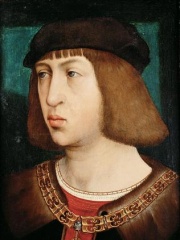
5. Philip I of Castile (1478 - 1506)
With an HPI of 81.29, Philip I of Castile is the 5th most famous Belgian Politician. His biography has been translated into 56 different languages.
Philip the Handsome (22 June/July 1478 – 25 September 1506), also called Philip the Fair, was ruler of the Habsburg Netherlands from 1482, including the counties of Artois, Burgundy and Charolais from 1493, and the first king of Castile from the House of Habsburg in 1506. Philip was the son of Maximilian I of Austria and Mary of Burgundy. Maximilian was a prince of the House of Habsburg who became Holy Roman emperor. Mary was the daughter of Charles the Bold and heiress of the wealthy and extensive complex of domains that made up Valois Burgundy, including the Burgundian Netherlands. In 1482, at the age of three, Philip's mother died and he inherited her titles and domains. As a result, he became the first Habsburg ruler of the Netherlands. Although his inheritance was, in part, challenged by the French king Louis XI, it was largely confirmed by the Treaty of Arras (1482) and the Treaty of Senlis (1493). Despite his young age, Philip quickly proved himself an effective ruler beloved by his people in the Low Countries, pursuing policies that favored peace and economic development, while maintaining a steady course of the government building. In 1496, Philip's father arranged for him to marry Joanna, the second daughter of Queen Isabella I of Castile and King Ferdinand II of Aragon. Around the same time, Philip's sister, Margaret, was given in marriage to Joanna's brother John, Prince of Asturias. After the deaths of her brother John, sister Isabella, and nephew Miguel, Joanna became heir presumptive to the thrones of Castile and Aragon. Most of Philip's time in Spain was spent consolidating his power, often leading to conflicts with his wife and her father. Joanna became queen of Castile when her mother died in 1504. Philip was proclaimed king in 1506, but died a few months later, leaving his wife distraught with grief. Joanna's father, Ferdinand II of Aragon, and son, Charles, were quick to seize power, confining the queen for the rest of her life on account of her alleged insanity. Philip died before his father, and therefore never inherited his father's territories or became emperor. However, his son Charles eventually united the Habsburg, Burgundian, Castilian, and Aragonese inheritances. By inheriting the Burgundian Netherlands and acquiring much of Spain and its possessions in the New World by marriage to Joanna, Philip was instrumental in greatly enhancing the territories of the Habsburgs, and his progeny would rule over vast European territories for the next five centuries.

6. Leopold II of Belgium (1835 - 1909)
With an HPI of 79.93, Leopold II of Belgium is the 6th most famous Belgian Politician. His biography has been translated into 83 different languages.
Leopold II (9 April 1835 – 17 December 1909) was the second king of the Belgians from 1865 to 1909, and the founder and sole owner of the Congo Free State from 1885 to 1908. Born in Brussels as the second but eldest-surviving son of King Leopold I and Queen Louise, Leopold succeeded his father to the Belgian throne in 1865 and reigned for 44 years until his death, the longest reign of a Belgian monarch to date. He died without surviving legitimate sons; the current king of the Belgians, Philippe, descends from his nephew and successor, Albert I. He is popularly referred to as the Builder King in Belgium in reference to the great number of buildings, urban projects and public works he commissioned. Leopold was the founder and sole owner of the Congo Free State, a private colonial project undertaken on his own behalf as a personal union with Belgium. He used Henry Morton Stanley to help him lay claim to the Congo, the present-day Democratic Republic of the Congo. At the Berlin Conference of 1884–1885, the colonial nations of Europe authorised his claim and committed the Congo Free State to him. Leopold ran the Congo, which he never personally visited, by using the mercenary Force Publique for his personal gain. He extracted a fortune from the territory, initially by the collection of ivory and, after a rise in the price of rubber in the 1890s, by forced labour from the Indigenous population to harvest and process rubber. Leopold's administration was characterised by systematic brutality and atrocities in the Congo Free State, including forced labour, torture, murder, kidnapping, and the amputation of the hands of men, women, and children when the quota of rubber was not met. In one of the first uses of the term, George Washington Williams described the practices of Leopold's administration of the Congo Free State as "crimes against humanity" in 1890. While it has proven difficult to accurately estimate the pre-colonial population and the extent to which it changed under the Congo Free State, estimates for the Congolese population decline during Leopold's rule range from 1 million to 15 million. The causes of the decline included epidemic disease, a reduced birth rate, and violence and famine caused by the regime. He was widely condemned because of his brutal and oppressive regime in the Congo that resulted in widespread suffering and loss of life including exploitation, violence, and immense human rights abuses, particularly involving the rubber trade.

7. Mary of Burgundy (1457 - 1482)
With an HPI of 78.56, Mary of Burgundy is the 7th most famous Belgian Politician. Her biography has been translated into 53 different languages.
Mary of Burgundy (French: Marie de Bourgogne; Dutch: Maria van Bourgondië; 13 February 1457 – 27 March 1482), nicknamed the Rich, was a member of the House of Valois-Burgundy, and ruler in her own right (sui iuris) over much of the Valois-Burgundian lands, from 1477 to 1482. Her effective rule extended over major part of the Burgundian Netherlands, while she also claimed the rest of the Burgundian inheritance, including domains that were seized by her cousin, the French king Louis XI in 1477, such as the Duchy of Burgundy, the Free County of Burgundy and several other lands, both within the Kingdom of France and the Holy Roman Empire. As the only child of Charles the Bold, ruler of the Valois-Burgundian State, and his wife Isabella of Bourbon, Mary became the heiress of Valois-Burgundian lands, and at the age of 19, upon the death of her father in the Battle of Nancy on 5 January 1477, she claimed the entire inheritance, being accepted as the new ruler in several domains. Her claims were not recognized by the French king Louis XI, who quickly seized various Valois-Burgundian domains, not only those that belonged to the French realm (such as the Duchy of Burgundy), but also some that belonged to the Holy Roman Empire (such as the Free County of Burgundy). Those disputes led to the War of the Burgundian Succession. In order to counter the appetites of the French king, she married Maximilian of Austria, son of the emperor Frederick III, thus securing the Habsburg support in her struggle against ambitions of Louis XI. This became a turning point in European politics, leading to a long French–Habsburg rivalry that would endure for centuries. Mary and Maximilian succeeded in securing much of the Burgundian Netherlands, but were not able to recapture domains already seized by the French king. After Mary's accidental death in 1482, her domains, titles and claims were inherited by her son Philip I the Handsome.

8. Auguste Beernaert (1829 - 1912)
With an HPI of 78.35, Auguste Beernaert is the 8th most famous Belgian Politician. His biography has been translated into 57 different languages.
Auguste Marie François Beernaert (26 July 1829 – 6 October 1912) was the prime minister of Belgium from October 1884 to March 1894, and the 1909 Nobel Peace Prize laureate.

9. Albert II of Belgium (b. 1934)
With an HPI of 78.10, Albert II of Belgium is the 9th most famous Belgian Politician. His biography has been translated into 78 different languages.
Albert II (born 6 June 1934) is a member of the Belgian royal family who reigned as King of the Belgians from 1993 until his abdication in 2013. Albert II is the son of King Leopold III and the last living child of Queen Astrid, born a princess of Sweden. He is the younger brother of the late Grand Duchess Joséphine-Charlotte of Luxembourg and King Baudouin, whom he succeeded following Baudouin's death in 1993. He married Donna Paola Ruffo di Calabria (now Queen Paola), with whom he had three children. Albert's eldest son, Philippe, is the current King of the Belgians. On 3 July 2013, King Albert II attended a midday session of the Belgian cabinet. He then announced that, on 21 July, Belgian National Day, he would abdicate the throne for health reasons. He was succeeded by his son Philippe on 21 July 2013. In doing so, he was also the second Belgian monarch to abdicate, following his father, Leopold III, who abdicated in 1951. His nephew is former Grand Duke of Luxembourg, Henri.
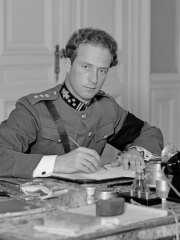
10. Leopold III of Belgium (1901 - 1983)
With an HPI of 76.72, Leopold III of Belgium is the 10th most famous Belgian Politician. His biography has been translated into 65 different languages.
Leopold III (3 November 1901 – 25 September 1983) was King of the Belgians from 23 February 1934 until his abdication on 16 July 1951. At the outbreak of World War II, Leopold tried to maintain Belgian neutrality, but after the German invasion in May 1940, he surrendered his country, earning him much hostility, both at home and abroad. Leopold's act was declared unconstitutional by Prime Minister Hubert Pierlot and his cabinet, who moved to London to form a government-in-exile, while Leopold and his family were placed under house arrest by the Germans. In 1944, they were moved to Germany and then Austria, before being liberated by the Americans, but banned for some years from returning to Belgium, where his brother Prince Charles, Count of Flanders, had been declared regent. Leopold's eventual return to his homeland in 1950 nearly caused a civil war, with serious calls for a secessionist republic in Wallonia. Under pressure from the government, he abdicated in favour of his son Baudouin in July 1951. Leopold's first wife, Astrid of Sweden, died in a road accident while on a driving holiday in Switzerland in August 1935, being much mourned by the public. Leopold, who was driving the vehicle when it hit a tree, suffered minor injuries. His morganatic second marriage, to Lilian Baels in captivity in 1941, was contrary to Belgian law, which stipulates that the civil marriage has to occur before a religious marriage, and she was never permitted the title of queen. Although Lilian and Leopold had originally planned to postpone their civil marriage until the end of the war, Lilian was soon expecting their first child, necessitating a civil marriage, which took place on 6 December 1941.
People
Pantheon has 156 people classified as Belgian politicians born between 100 BC and 1997. Of these 156, 34 (21.79%) of them are still alive today. The most famous living Belgian politicians include Ursula von der Leyen, Albert II of Belgium, and Herman Van Rompuy. The most famous deceased Belgian politicians include Charles V, Holy Roman Emperor, Pepin the Short, and Clovis I. As of April 2024, 3 new Belgian politicians have been added to Pantheon including Filip Dewinter, Mahinur Özdemir Göktaş, and Gabriella Willems.
Living Belgian Politicians
Go to all RankingsUrsula von der Leyen
1958 - Present
HPI: 81.50
Albert II of Belgium
1934 - Present
HPI: 78.10
Herman Van Rompuy
1947 - Present
HPI: 74.69
Guy Verhofstadt
1953 - Present
HPI: 69.50
Elio Di Rupo
1951 - Present
HPI: 69.20
Charles Michel
1975 - Present
HPI: 67.70
Yves Leterme
1960 - Present
HPI: 67.22
Princess Astrid of Belgium, Archduchess of Austria-Este
1962 - Present
HPI: 66.61
Queen Mathilde of Belgium
1973 - Present
HPI: 66.37
Willy Claes
1938 - Present
HPI: 63.57
Bart De Wever
1970 - Present
HPI: 63.13
Alexander De Croo
1975 - Present
HPI: 60.77
Deceased Belgian Politicians
Go to all RankingsCharles V, Holy Roman Emperor
1500 - 1558
HPI: 87.50
Pepin the Short
715 - 768
HPI: 83.38
Clovis I
466 - 511
HPI: 82.38
Philip I of Castile
1478 - 1506
HPI: 81.29
Leopold II of Belgium
1835 - 1909
HPI: 79.93
Mary of Burgundy
1457 - 1482
HPI: 78.56
Auguste Beernaert
1829 - 1912
HPI: 78.35
Leopold III of Belgium
1901 - 1983
HPI: 76.72
Margaret of Austria, Duchess of Savoy
1480 - 1530
HPI: 76.14
Baudouin of Belgium
1930 - 1993
HPI: 76.11
Albert I of Belgium
1875 - 1934
HPI: 76.09
Mary of Hungary
1505 - 1558
HPI: 75.80
Newly Added Belgian Politicians (2025)
Go to all RankingsFilip Dewinter
1962 - Present
HPI: 48.85
Mahinur Özdemir Göktaş
1982 - Present
HPI: 41.14
Gabriella Willems
1997 - Present
HPI: 34.63
Overlapping Lives
Which Politicians were alive at the same time? This visualization shows the lifespans of the 25 most globally memorable Politicians since 1700.

